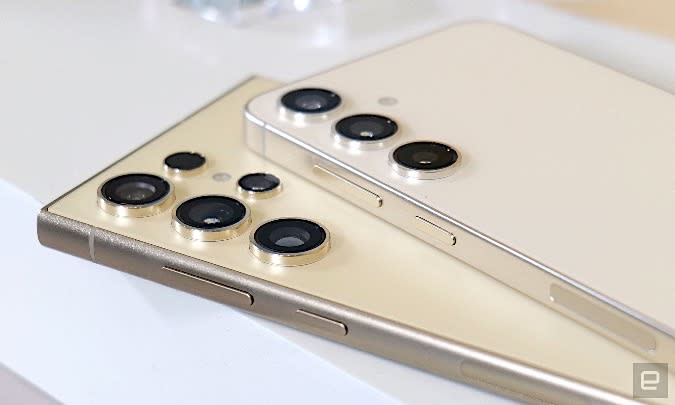Samsung’s big Unpacked event yesterday unashamedly focused on the company’s annual flagship phone refresh. No smart speakers, no tablets, no wearables (pretty much…) just three more phones, each with entirely different unique features. Just kidding: It’s mostly just changes to cameras and screen size. Same as it’s been since the Galaxy S20.
While introducing the Galaxy S24, S24+ and S24 Ultra, the company wheeled out streamer and YouTuber Pokimane to cheerlead the even brighter screens, while MrBeast — who Samsung couldn’t afford to have there in person? — showcased some of the camera tricks and specs of the flagship S24 Ultra.
However, beyond the predictable spec bumps, Samsung went to town on AI features this year. And they’re intriguing, inching beyond what Google’s been doing on its Pixel series for years.
Sure, there are photography-augmenting features, with the S24 sniffing out unwanted reflections and shadows, but now generative AI will power auto-fill features, extending the background of shots to help recompose wonky photos. With video, a new feature will use AI to generate more frames to create slow-mo clips not actually captured in slow motion.
Samsung’s added AI smarts beyond the camera too, with new features for search, translations, note creation and message composition. New transcription tricks, when you record meetings and other conversations, mean S24 will split audio recordings into separate people talking and reformat it on the fly. You can even share selected parts or get the smartphone to summarize meetings and notes for you. I’m intrigued to see what my smartphone thinks is important during my weekly catchups with the Engadget team.
I’ll dig into the specs for the new flagship S24 below (it’s a Samsung-heavy TMA), but this year, it’s really about the software. And the good news is that many of these features will make their way to selected older Galaxy devices later this year.
— Mat Smith
You can get these reports delivered daily direct to your inbox. Subscribe right here!
The biggest stories you might have missed
Sony is making an Until Dawn movie
Galaxy S24 and S24 Plus hands-on
How to pre-order the Samsung Galaxy S24 Ultra
Alphabet’s Wing shows off a larger delivery drone
Titanium phones for power users.
The $1,300 Galaxy S24 Ultra is Samsung’s biggest AI bet yet. Sure, the hardware design doesn’t appear to have changed much, but there’s now a titanium frame (available in colors beyond monochrome shades, Apple), ensuring the biggest flagship should feel lighter and easier to wield than previous iterations. The S24 Ultra’s telephoto camera is now based on a 50-megapixel sensor (up from 10MP on the S23 Ultra) with a 5x optical zoom. If you’re obsessed with specs, you might recall the S23 Ultra packed a 10x optical zoom. The company apparently chose this tweak based on customer feedback and use patterns, which saw 5x as the most frequently used zoom mode. We’ve got first impressions right here.
Look, don’t touch.
Near the end of its Unpacked event, Samsung started talking about its health-focused software, Samsung Health, and those watching the show fought to maintain concentration. Then, Samsung teased a new tinier piece of health-focused hardware, the Galaxy Ring. It’ll have lots of sensors and hooks into the Health software suite. But that’s all we know.
But if Samsung’s getting involved with smart rings, all we can say is: Watch out, Oura.
The company updated its disclaimer after settling a lawsuit.
When you open an Incognito browser on Chrome, you’ll see a notification warning that other people using your device won’t be able to see your activity, but your downloads, bookmarks and reading items will still be saved. Now, Google has updated that disclaimer in Chrome’s experimental Canary channel, shortly after agreeing to settle a $5 billion lawsuit accusing it of tracking Incognito users. The plaintiffs of the 2020 lawsuit argued that by tracking users on Incognito, Google was giving people the false belief that they could control the information they were willing to share. The new disclaimer in Canary says Incognito mode won’t change how websites collect people’s data.
She spent 14 years as COO and 12 as a board member.
Sheryl Sandberg is leaving Meta’s board of directors after 12 years, her last official role with the company. Sandberg spent 14 years as Meta’s COO and Mark Zuckerberg’s top lieutenant and 12 years on the company’s board. Her role as a board member will officially end in May. In a post on Facebook, she said, “This feels like the right time to step away,” and she would continue to advise the company. Hey, at least she posted it on Facebook.




